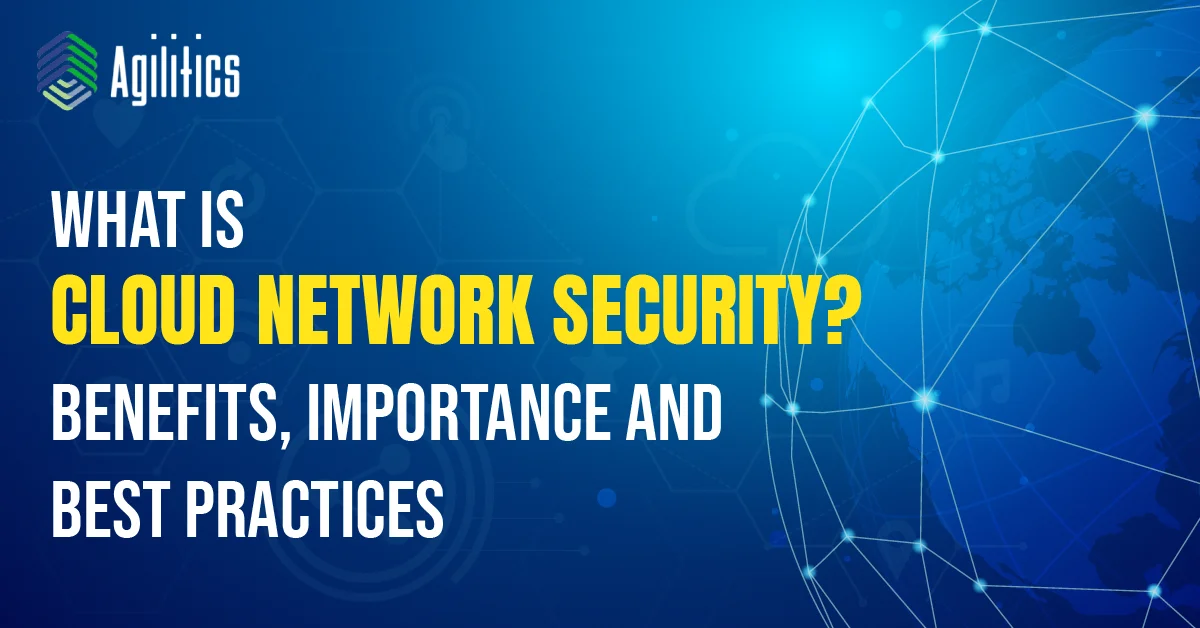When you think about cybersecurity, what comes to mind? Perhaps security measures such as firewalls, antivirus software, and maintaining a good backup strategy.
However, there is another area of cybersecurity called cloud network security. Although this space has not yet developed its own jargon, it could very well become mainstream in the near future.
As information technology becomes more and more interconnected, companies may encounter threats from anywhere, including their own on-premises networks and those of their customers’ cloud providers.
Introduction to Cloud Network Security?
Cloud network security is a term that refers to the security measures taken to protect data and information that is stored on or transmitted through a cloud computing environment.
This can include measures taken to protect the physical infrastructure, the data and applications that reside on the infrastructure, and the users who access the data and applications.
Cloud network security is nearly synonymous with cloud infrastructure security (CIS). Cloud network security encompasses the security of both private and public clouds where the network is located.
Whether it’s a public or private cloud, there are numerous threats that need to be managed. One of these includes malicious users attempting to gain access to sensitive information on an organization’s public or private cloud network.
It is a growing concern for businesses and organizations that rely on cloud-based services, as there is an increased risk of data breaches and cyber-attacks.
There are a number of steps that can be taken to ensure the security of data in the cloud, such as encrypting data, using secure protocols, and implementing access control measures.
Benefits of Cloud Network Security
Cloud network security is the process of protecting cloud-based networks and data from unauthorized access and cyber threats.
It includes a range of security measures and technologies designed to protect cloud infrastructure, data, and applications from attacks.
Key benefits of cloud network security also comprise the following:
- It is a critical part of any cloud computing security strategy.
- It helps to protect sensitive data and applications from being accessed or compromised by unauthorized users.
- It also helps to prevent data breaches and other security threats.
There are a number of different cloud network security measures that can be implemented, including firewalls, intrusion detection, and prevention systems, and data encryption. These measures can help to protect data and applications from being accessed or compromised by unauthorized users.
Importance of Cloud Network Security
As our world becomes increasingly digitized, the importance of cloud network security grows exponentially. The cloud offers vast amounts of storage and computing power, making it an attractive target for cybercriminals.
And because the cloud is accessible from anywhere in the world, it makes it even more vulnerable to attack. That’s why it’s more important than ever to ensure your cloud network is secure.
Cloud network security is a complex issue, but the most vital thing to remember is that it’s not just about keeping your data safe. It’s also about protecting the integrity of your company’s reputation.
That means ensuring that all of your client’s data and communications are secure including potentially sensitive information like personally identifiable information (PII).
To keep your cloud network secure, you need to take a layered approach. A solid foundation of security controls such as firewalls and intrusion prevention systems (IPS) will help prevent outside threats from entering your environment.
However, these controls alone aren’t enough to protect against all types of attacks. That’s why it’s important to also use tools that can detect breaches on your network and mitigate them before they become too serious.
Cloud Network Security is an important aspect of cybersecurity, but most organizations are not aware of the importance of how to leverage cloud services to secure their data.
Best Practices for Cloud Network Security
Cloud computing has dramatically changed the way enterprises do business today. As more companies turn to the cloud for their IT needs, security concerns begin to surface.
Security breaches and malicious activity surrounding these types of environments are often hard to detect and even harder to defend against. Cloud admins will need to balance their time between managing the infrastructure and keeping an eye on how it performs as a whole.
This can be a difficult task, as hackers are continually researching new ways to compromise cloud networks, making new exploits every day.
Below are 8 best practices you should follow in order to secure your cloud environments:
1. Use a Reputable Cloud Provider
Be sure to do your research when choosing a cloud provider. Select a company that has a proven track record of security and is compliant with industry-standard security protocols.
2. Enable Multi-Factor Authentication
Multi-factor authentication (MFA) adds an extra layer of security by requiring users to provide additional information beyond their username and password. This can include a one-time code from a handheld device or a biometric factor like a fingerprint or iris scan.
3. Encrypt Your Data
Data encryption is a critical part of protecting your information in the cloud. Be sure that all data in transit and at rest is encrypted using industry-standard algorithms.
4. Implement Latest Security Policies and Procedures
Establishing strict security policies and procedures can help prevent unauthorized access to your cloud network. Be sure to train all users on these policies and procedures, and test them regularly.
5. Monitor Your Systems
Monitor your systems closely for any unusual activity. This can help you to spot potential security breaches and take action to fix them.
6. Secure Data End-Points
When it comes to securing your cloud infrastructure, one of the most important things to consider is securing your user endpoints. This means ensuring that all devices that connect to your cloud environment are properly secured.
7. Monitor Cloud Usage Policies
Many organizations that have used cloud services are not always taking the necessary precautions to secure data and applications stored in the cloud. As a result, employees tend to bypass or disregard established policies on how they interact with their online accounts.
8. Use Complex Passwords
Password hygiene is important for any service, but it’s especially important when your data is stored remotely. The longer and more complex your password is, the harder it will be for someone to crack.
By taking these steps, you can help ensure your cloud network is secure and protected against cyber threats.
Prominent Factors of Cloud Network Security
Cloud network security presents some unique challenges that aren’t present in a traditional on-premise data center. But what are some of the biggest challenges facing cloud network security today?
With many cloud-based providers offering their services for free or low cost, there’s a temptation to switch all your systems over to the cloud in order to save money. However, this can be a bad idea if you don’t take into account the increased risk associated with moving sensitive data off-premise and into someone else’s hands.
Cloud network security is a complex issue, but it is important to understand the risks and take steps to mitigate them. The cloud offers many advantages, but it also introduces new security challenges. Organizations that use the cloud need to be aware of these challenges and take steps to protect their data and applications.
Some of these challenges include:
- Cloud security is hard to define. There are many different ways to secure a cloud network and it’s not always clear which approach will work best for your company.
- Cloud security is still a relatively new concept. Many people don’t know how to approach it, let alone implement it effectively.
- There are many aspects to cloud network security that need to be taken into account: physical and logical networks, encryption and authentication, access control and authorization, etc.
- Cloud providers can’t protect you from everything. You still have to take responsibility for your own security. It’s not enough to simply put up firewalls and let your cloud provider handle the rest.
- The cloud is a shared environment, with many different users and applications sharing resources. This makes it difficult to secure.
Given all of these challenges, it’s clear that securing cloud networks is a complex and ever-changing task. But it’s a task that must be undertaken if businesses are to take full advantage of the benefits of the cloud.
Summary
Cloud Security and Risk Management is a complex field, but one that is critical to any organization using cloud services. It has become the new frontier for businesses looking to introduce the cloud.
It is not a new idea and has been available for quite some time, but the introduction of public cloud platforms has brought about several changes in networking protocol, security, and other aspects that proved to be challenging for some organizations.
Minimizing risk, particularly the financial and strategic risks related to cloud computing, should be an important priority for any business or organization. A well-constructed cloud security plan can ensure optimal use of the public and private cloud at the right cost.
Looking to pursue a career in Cloud Security? Checkout our Certificate in Cloud Security Knowledge (CCSK).
We strive to provide business professionals with the skills and knowledge necessary to increase work performance and drive greater return on investment for the global customers we support. Agilitics delivers customized technology and management training solutions to large corporations and government agencies around the world.


